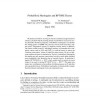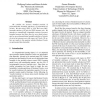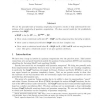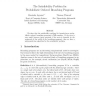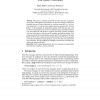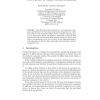96
Voted
COCO
1998
Springer
15 years 6 months ago
1998
Springer
We define probabilistic martingales based on randomized approximation schemes, and show that the resulting notion of probabilistic measure has several desirable robustness propert...
94
Voted
COCO
1998
Springer
15 years 6 months ago
1998
Springer
We present a notion of resource-bounded measure for P and other subexponential-time classes. This generalization is based on Lutz's notion of measure, but overcomes the limit...
COCO
1998
Springer
15 years 6 months ago
1998
Springer
We consider the resource bounded measure of polynomial-time learnable subclasses of polynomial-size circuits. We show that if EXP 6= MA, then every PAClearnable subclass of P=poly...
90
Voted
COCO
1998
Springer
15 years 6 months ago
1998
Springer
Ladner [18] showed that there are no minimal recursive sets under polynomial-time reductions. Given any recursive set A, Ladner constructs a set B such that B strictly reduces to ...
118
Voted
COCO
1998
Springer
15 years 6 months ago
1998
Springer
We use the powerful tools of counting complexity and generic oracles to help understand the limitations of the complexity of quantum computation. We show several results for the p...
94
Voted
COCO
1998
Springer
15 years 6 months ago
1998
Springer
We show that MAEXP, the exponential time version of the Merlin-Arthur class, does not have polynomial size circuits. This significantly improves the previous known result due to K...
134
Voted
COCO
1998
Springer
15 years 6 months ago
1998
Springer
We show that the perfect matching problem is in the complexity class SPL in the nonuniform setting. This provides a better upper bound on the complexity of the matching problem, a...
108
Voted
COCO
1998
Springer
15 years 6 months ago
1998
Springer
We show that the satisfiability problem for bounded-error probabilistic ordered branching programs is NP-complete. If the error is very small, however (more precisely, if the erro...
123
Voted
ASIAN
1998
Springer
15 years 6 months ago
1998
Springer
Abstract. We present a constraint system OF of feature trees that is appropriate to specify and implement type inference for first-class messages. OF extends traditional systems of...
101
click to vote
ASIAN
1998
Springer
15 years 6 months ago
1998
Springer
Abstract. Type-directed partial evaluation is a new approach to program specialization for functional programming languages. Its merits with respect to the traditional offline part...
